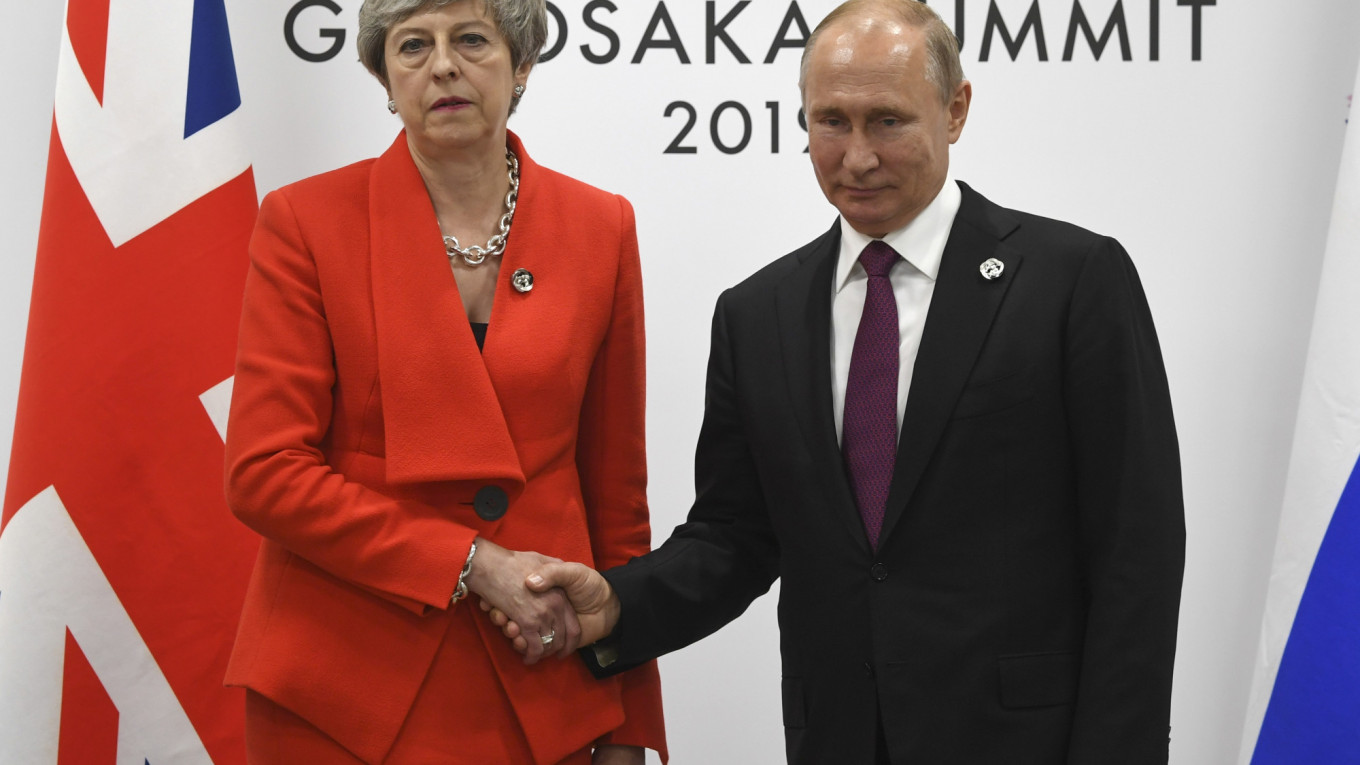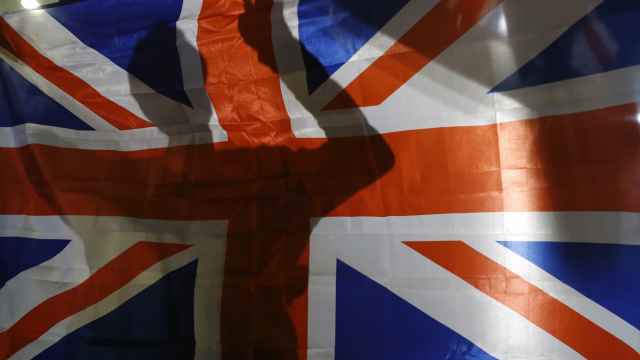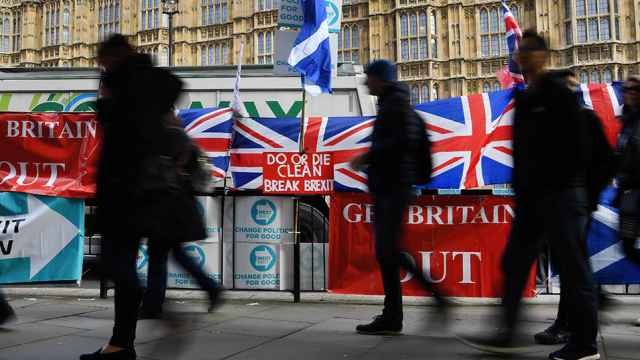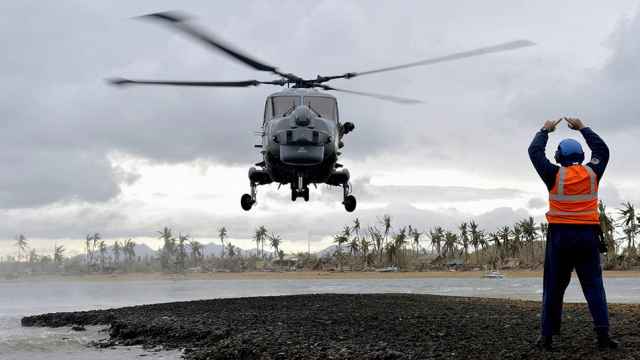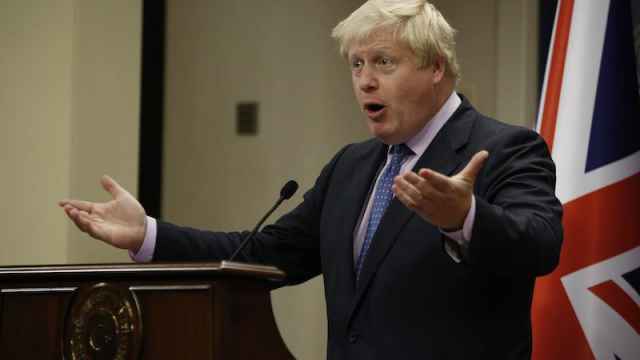One of the enduring memories of the Osaka G20 summit is likely to be that of a stony-faced Theresa May, Britain’s here-today-gone-tomorrow prime minister, sharing the obligatory handshake photo opportunity with Vladimir Putin before their talks. She had every reason to be sullen, meeting the man who ordered assassinations on British soil, and maybe even helped swing the Brexit referendum that both made and broke her premiership. But for all that, she was right to take the meeting.
Of course, it sticks in the craw, given Moscow’s unapologetic adventurism: the continuing refusal to acknowledge its blame for the MH17 shoot-down, its continued undeclared war in the Donbas, its continued protection of the suspects not just in the Skripal but also Litvinenko affair — the list goes on.
But such contacts are not a prize for good behavior. They are, rather, essential elements of the diplomatic process, of signaling intent, offering inducements, and building deterrence.
In particular, they are a chance to get through Putin’s protective kremlin of courtiers and advisers, and say something directly to a man who, these days, doesn’t hear many tough truths.
The trick is to balance diplomatic etiquette with undiplomatic honesty. Canadian prime minister Stephen Harper, for example, struck a pitch-perfect note at the 2014 G20 summit, when he memorably said “I guess I'll shake your hand but I have only one thing to say to you: You need to get out of Ukraine.”
The Russians, eager to present themselves as welcome players in the geopolitical premier league, wanted this meeting and will do everything to spin it as a step towards “normalization,” their new buzzword for an end to sanctions.
Of course, it is nothing of the sort. In between unsubtle attempts to troll the West about the end of liberalism, Putin used an extended interview with the British Financial Times on the eve of Osaka to make his pitch.
It was all about the money: “All this fuss about spies and counterspies, it is not worth serious interstate relations. This spy story, as we say, it is not worth five kopecks.” Rather, he urged, restore proper economic relations, so the businesspeople could earn money, create jobs and pay taxes.
It remains to be seen what will happen post-Brexit, especially if it turns out to be a “hard Brexit” with no agreement with the European Union.
It could be that a new prime minister, seeing the British economy drowning, will be willing to look for a life vest anywhere, even Russia.
But for now, there is no sense that London is willing to forgive and forget. No British representatives voted for Russia’s rejoining PACE, though its delegation's two abstentions counted as supporting votes (13 opposed it). The British government is refining its Russia strategy and using the word “threat” instead of softer formulations such as “challenge.”
May herself took a strong line with Putin. Russia, she stressed, cannot be treated as a normal country until it begins to act like one, until it “stops the irresponsible and destabilizing activity that threatens the UK and its allies, including hostile interventions in other countries, disinformation and cyber attacks.”
Just as Russia’s situation is not magically improved by the meeting, so too a few tough words from a British prime minister already with a foot out of the door are unlikely to bring some epiphany for Putin.
However, given that much of Russian policy seems predicated on the hope that the collapse of Western will and unity are just over the horizon, the hope must be that May’s firm personal stand could at least undo some of the damage done by Donald Trump’s maunderings while “spending some very good time together” with the Russian president.
Besides, the alternative was a crude snub, and we have seen that when Putin feels diplomatically excluded, he does whatever he needs to do to force his way into the conversation.
Part of the reason behind his intervention into Syria in 2015 was, after all, a counter to U.S. President Barack Obama’s efforts to isolate Russia. You don’t do that, was the message: If need be, we will inject ourselves into a situation that matters to you, and force you to talk to us. The outcome was a photo op at the U.N. General Assembly with Obama that rivaled the May-Putin handshake for awkwardness — and in effect a diplomatic victory for Moscow.
If you fail to observe the diplomatic niceties, the Kremlin’s thinking seems to go, we’ll respond in distinctly undiplomatic ways.
But there is also a long-term factor. While Putin-the-man may stand of the interests of a handful of kleptocrats and cronies, Putin-the-president also represents Russia. As his era begins — slowly — to near its end, it behooves the West to be thinking about a post-Putin Russia. Open disrespect plays to Putin’s own legitimating narrative: that the West hates and seeks to undermine Russia.
Hard as it may be, the trick is to demonstrate a tough response to the Kremlin without making this about, to use an over-used term, making it Russophobia. Otherwise, the chances that Putin’s successor will be willing and able to adopt a less confrontational approach become all the more remote.
In this Theresa May, the vicar’s daughter who seems to have been driven so strongly by a sense of duty, was perhaps doing one of her last services to everyone when she gritted her teeth and shook Putin’s hand.
A Message from The Moscow Times:
Dear readers,
We are facing unprecedented challenges. Russia's Prosecutor General's Office has designated The Moscow Times as an "undesirable" organization, criminalizing our work and putting our staff at risk of prosecution. This follows our earlier unjust labeling as a "foreign agent."
These actions are direct attempts to silence independent journalism in Russia. The authorities claim our work "discredits the decisions of the Russian leadership." We see things differently: we strive to provide accurate, unbiased reporting on Russia.
We, the journalists of The Moscow Times, refuse to be silenced. But to continue our work, we need your help.
Your support, no matter how small, makes a world of difference. If you can, please support us monthly starting from just $2. It's quick to set up, and every contribution makes a significant impact.
By supporting The Moscow Times, you're defending open, independent journalism in the face of repression. Thank you for standing with us.
Remind me later.



